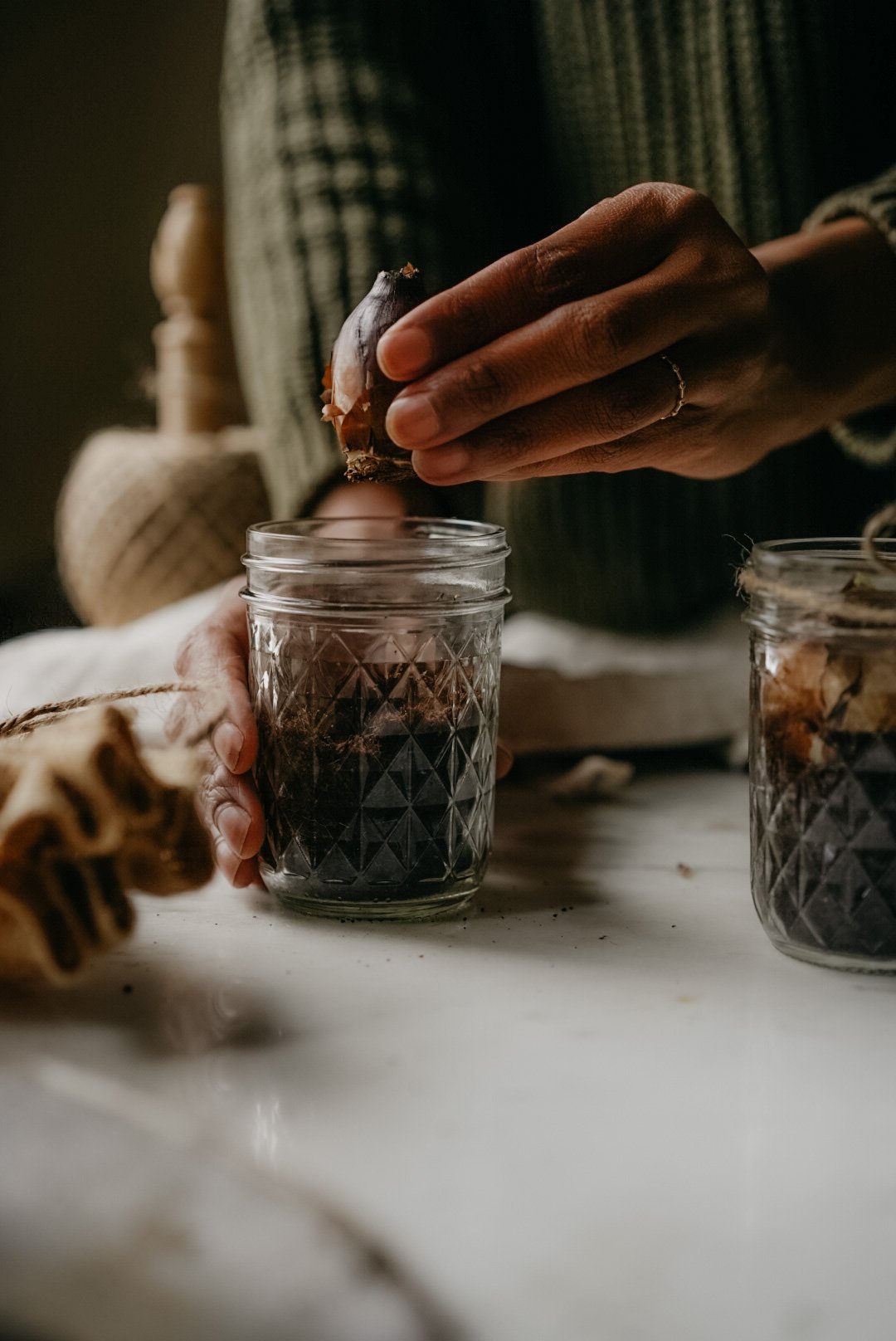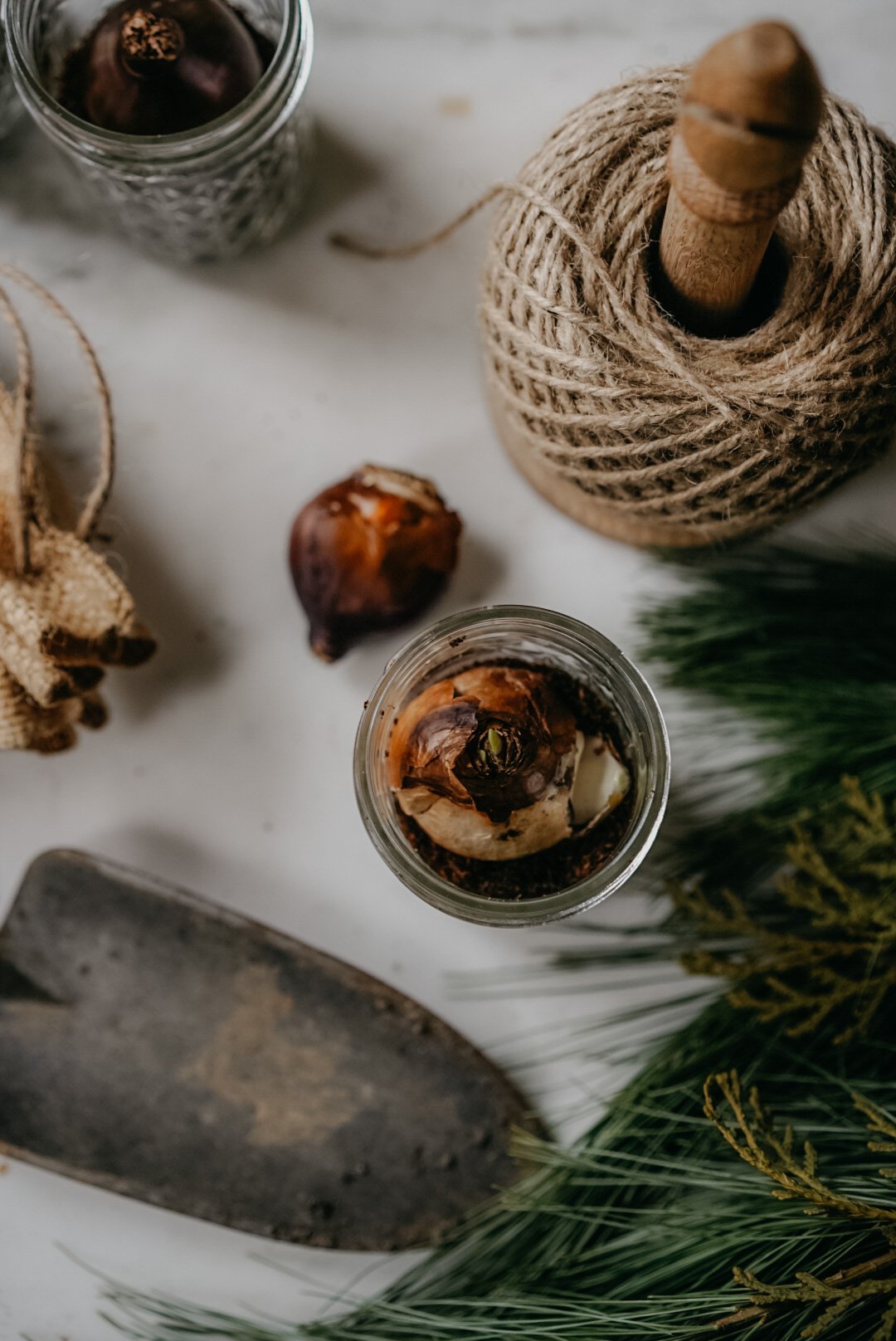paperwhites | a winter garden
This post is sponsored by the makers of Ball® home canning products.*
while my body is resting from the garden, flowers still beckon to me. i'm resting deeply as last month, i turned in the first copy of my manuscript, phew, for my upcoming book to my editor. i wrote in its pages, this seasonal ritual i'm sharing below.
paperwhites blooms in midwinter feeds my souls and reminds me of hope in the dark. these quiet + tender rituals root me in time as we move through the liminal space of the winter solstice, holding the longest nights of the year yet the beginning of the advent of the sun.
"The seed is in the ground. Now may we rest in hope. While darkness does its work."
Wendell Berry
paperwhite narcissus are native to Mediterranean region from northern Africa to southern Spain and southern France + areas of central asia, where you can find them cultivated and growing on rocky hillsides and meadows. historically they were widely shared as they were an early good traded. they arrived in China about 1,000 years ago, probably introduced by middle eastern merchants.
paperwhites belong to the narcissus family that you may be familiar with as some of the first blooms in the spring: the daffodil, the jonquil, and the paperwhite. they symbolize hope in the darkness of winter
because paperwhites do not require a cooling period like their kin, they are easiest to force indoors, although i do save daffodils bulbs from our autumn planting, cool in the refrigerator for a period + force bloom them in january. paperwhites emerge as they are planted, with flowers appearing in 3–4 weeks.
narcissus papyraceus thrives in moist, peat moss based potting mix as well as shallow containers of water with rocks at the bottom. they are an easy and adaptable plant to force a bloom indoors. they produce a cluster of the most fragrant + delicious, snowy blooms. their scent on a winters morning is enveloping.
ziva is a common variety with a musky scent + pure white flowers. galilee has pure white flowers + a moderate fragrance. i’ve read that ariel is a great variety with blooms a little larger than diva with stronger stems less likely to topple. inball is a good variety if you do not prefer the strong scent but love the blooms.
traditionally, i use a shallow bowl or tall Ball® jar with rocks. i’ve forced bloomed paperwhites in a Ball® Half Pint Jar with a germination plate. this year, i’m experimenting with tucking single bulbs in peat moss into Ball® jars for holiday gifting. a winter ritual to do + share with others.
i often find paperwhite bulbs in our local co-op as well as online sources. they are a favorite of mine to gift this time of year.
paperwhites herald rebirth + new beginnings when they bloom on our windows ledge at the solstice they symbolize the return of the sun.
supplies
paperwhites bulbs
Ball® jars of various sizes (i like Ball® Wide Mouth jars or Ball® Crystal Quilted Half Pint jars for easy gifting)
peat moss mix or stones
water
vodka
directions
if planting with a soil mixture, gather a bowl and put your peat moss mix slowly add water and stir until the mix is moist but not soggy.
take a Ball® jar of your choosing + fill with about two inches of peat moss or stones, this the minimum amount of space the root system needs. nestle the paperwhite bulb into the jar point side up. they will grow closely together in wide mouth jars. if using rocks, water until the it reaches just the base of the bulbs, the bulbs will spread its roots down. be cautious, bulbs sitting in soggy conditions can rot.
set in indirect light. check bulbs frequently as growing bulbs can dry out within a day or two + only water when dry. it takes three to four weeks from planting to bloom. water with a mixture of five part water to one part vodka when the leaves + flower spike appears. this will help the paperwhite to grow straight, compact + not topple over. tie a ribbon around your Ball® jar for gifting + set in a windows ledge.
Paper-White Narcissus
Strange, how they got their name—
a boy, barely a man,
looked into sunlit water
and saw himself so beautiful
he spent his life pursuing
that treacherous reflection.
There is no greater loneliness.
Here they are, risen
from the darkness of the pebbled pool
we have made for them in a dish—
risen and broken through
the long, green capsules
to show us their faces:
they are so delicate they invite
protection or violation,
and they are blind.
*Disclosure: This is a sponsored post that is part of an ongoing partnership with the Fresh Preserving Division of Newell Brands. They have provided jars, equipment and monetary compensation. All thoughts and opinions expressed remain my own.






